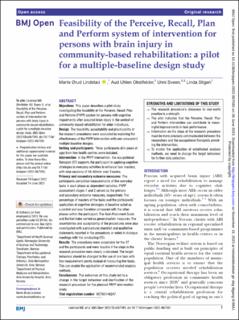Feasibility of the Perceive, Recall, Plan and Perform system of intervention for persons with brain injury in community-based rehabilitation: A pilot for a multiple-baseline design study
Peer reviewed, Journal article
Published version
Permanent lenke
https://hdl.handle.net/11250/3102857Utgivelsesdato
2023Metadata
Vis full innførselSamlinger
Sammendrag
Objectives This paper describes a pilot study
investigating the feasibility of the Perceive, Recall, Plan
and Perform (PRPP) system for persons with cognitive
impairments after acquired brain injury in the context of
community- based rehabilitation for older individuals.
Design The feasibility, acceptability and practicability of
the research procedures were evaluated by exploring the
effectiveness of the PRPP intervention with non-concurrent
multiple baseline designs.
Setting and participants Three participants (63+years of
age) from two health centres were included.
Intervention In the PRPP intervention, the occupational
therapist (OT) supports the participant in applying cognitive
strategies in everyday activities to enhance task mastery,
with nine sessions of 45–60 min over 3 weeks.
Primary and secondary outcome measures The
participants completed measurements of five everyday
tasks in each phase as dependent variables. PRPP
assessment stages 1 and 2 served as the primary
and secondary outcome measures, respectively. The
percentage of mastery of the tasks and the participants’
application of cognitive strategies at baseline acted as
a control and was therefore compared with the other
phases within the participant. The Goal Attainment Scale
and Barthel Index served as generalisation measures. The
uncertainties and acceptability of the procedures were also
investigated with a procedural checklist and qualitative
statements reported in the procedures or noted in dialogue
meetings with the conducting OTs.
Results The procedures were acceptable for the OT
and the participants and were feasible if the steps in the
research procedure were clearly understood. The target
behaviour should be changed to the use of one task with
five measurement points instead of measuring five tasks.
This can enable the application of recommended analysis
methods.
Conclusions The outcomes of this study led to a
change in the target behaviour and clarification of the
research procedure for the planned PRPP intervention
study.

